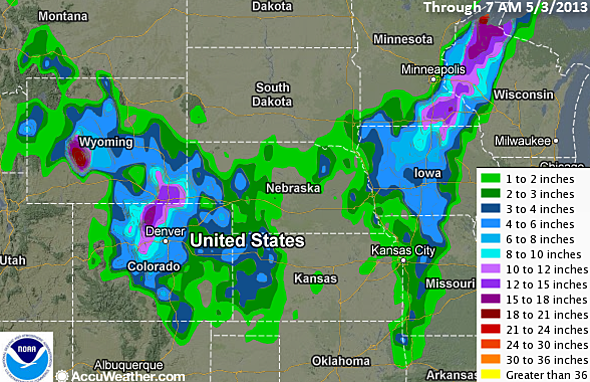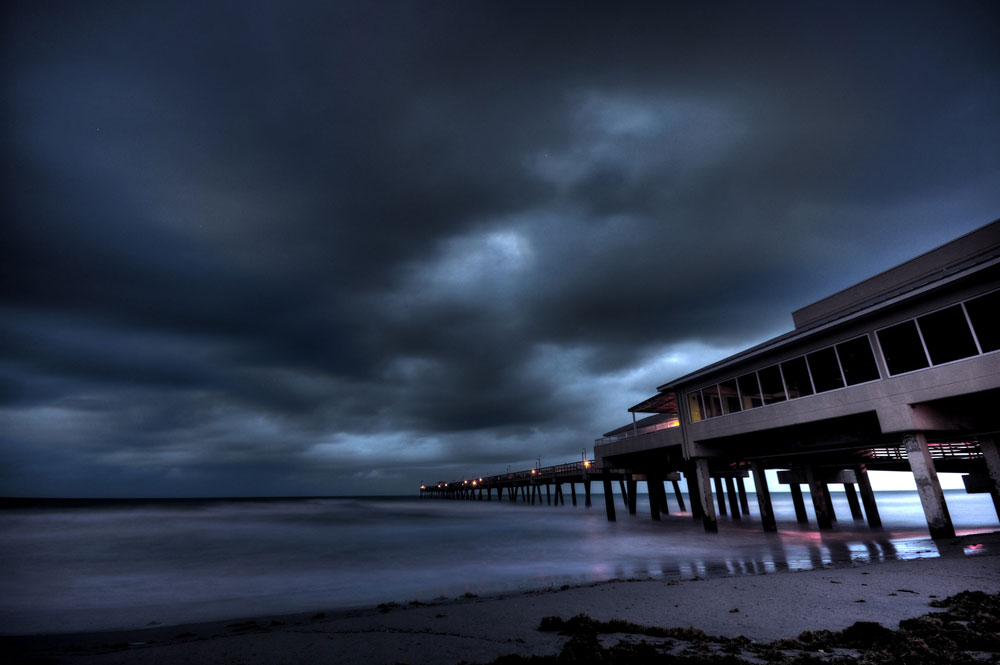Historic Snowstorm Records; Climate Change to Blame?


This article was provided by AccuWeather.com.
While the debate as to whether climate change is responsible for the rare May snow across the Plains and Upper Midwest continues, there is no question that the snowstorm is historical with numerous records broken.
The snowstorm dumped in excess of a foot across Minnesota and Wisconsin, 6 to 12 inches in central Iowa and up to several inches across other parts of the central Plains on days when highs in the 60s and 70s are more common.
At the top of the snowstorm's total list (east of the Rockies) sits Blooming Prairie, Minn., and an area near Hayward, Wis., with 18 inches.
Rochester, Minn., picked up 14 inches of snow by the close of Thursday, easily surpassing May 1944 as the city's all-time snowiest May.
Eau Claire, Wis., Des Moines, Iowa, and Omaha, Neb., are other cities that recorded their greatest May snow totals. Records for these cities date back to the late 1800s.
The total of 8.7 inches in Eau Claire (as of midnight CDT Friday) shattered the previous record of 3.3 inches from May 2001.
Get the world’s most fascinating discoveries delivered straight to your inbox.
May 1907 with its 1.3 inches was originally Des Moines' snowiest May on record before the city's airport measured 3.4 inches at midnight, then reported a snow depth of 5.0 inches at 7 a.m. Friday.
RELATED: PHOTOS: Historic May Snowstorm Buries Rockies, Plains Historic Snowstorm Hits Plains to Upper Midwest AccuWeather.com's Climate Change Page
Before this snowstorm, "no station has reported an inch or more of snowfall in Iowa in May since 1967," stated General Forecaster Jim Lee in a report issued by National Weather Service's Des Moines Office.
Not only did the 3.1 inches of snow in Omaha break the previous May record of 2.0 inches from 1945, but also marked the city's first measurable snow in 46 years.
Thursday was only the second time in recorded history that Kansas City, Mo., received measurable snow in May. A total of 0.5 of an inch fell Thursday, while the only other such occurrence was May 3, 1907.
"While snow is not unheard of away from the Rockies and northern tier states during May, it is the amount of snow and the extent of the snow that is so unusual," stated AccuWeather.com Expert Senior Meteorologist Alex Sosnowski.
"Snowstorms during May in the Midwest are typically highly localized."
For some, the historical aspect of this snowstorm raises the question as to whether climate change is fully or partially responsible.
Facebook user Don Adkins: "Thirty [sic] degrees below normal temps for this time of year. Must be global warming!"
"With a warming planet, we expect to see more extremes, which includes big and late-season snowstorms. That does not necessarily mean we can link this snowstorm to global warming," stated AccuWeather.com Expert Senior Meteorologist and Climate Change Blogger Brett Anderson.
"What I can say is that this snowstorm was linked to blocking [an atmospheric roadblock] in Canada that forced cold air into the Plains and the storm to stall. Those two ingredients led to the significant snow."
AccuWeather.com Expert Senior Meteorologist Bernie Rayno weighed in by saying, "I do not believe this [snowstorm] has anything to do with climate change. It is ridiculous that 'climate change' is being blamed for seemingly everything recently."
"Go back to the 1940s and 1930s and you will see similar storms. There was a storm in LATE May 1947 that delivered significant snow to the Midwest."
The storm Rayno is referring to dropped 8 inches of snow on Cherokee, Iowa, and as much as 10 inches on Gays Mills, Wis.
Other Facebook users chimed in on the climate change debate, which AccuWeather.com will continue to address later next week by allowing expert climatologists to weigh in on both sides of the issue.
Ron Koch: "Hey, they only bring up global warming when they have current data to support the lie."
Sam Mulligan: "There is a difference between WEATHER and CLIMATE. weather is over a short period of time, climate is long term. hence the name: CLIMATE change."
Robert Gould: "Sam Mulligan- Weather actually is climate since climate is merely the sum of all weather events over a given period."
Brien Murphy: "In the Northern hemisphere we should expect "Global" warming to start soon! Then towards the end of the year into the first part of next year more "Global" cooling. THESE USED TO BE CALLED SEASONS!"
Grant Freerks: "the only thing obvious is, weather is happening. hate to burst your collective global warming bubble but...hey weather happens. W(h)ether you like it or not. Global warming/cooling/change is a hoax. Get used to it."
Hal Slusher: "The sun is causing global warming and in winter when sun doesn't shine so must we get global cooling."
Vicki Sprinkle: "Just proves no matter what man tries to do. Mother Nature will prevail."
Alec Mosconi: "So this will be labeled as global warming...and snow in Florida in the late 1890's was caused by...what? I'm not a denier, but freak things occur all the time and it's not all because of fossil fuels."
AccuWeather.com. All rights reserved. More from AccuWeather.com.
With much of the country experiencing an unseasonably warm winter, fears of climate change come to mind. See how well you understand recent weather, climate and the difference between them.
Weather vs. Climate Change: Test Yourself



